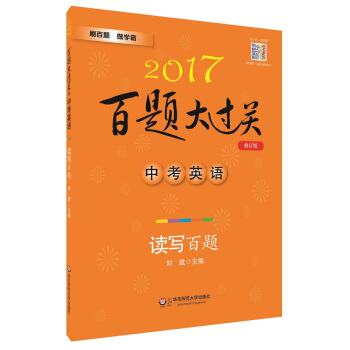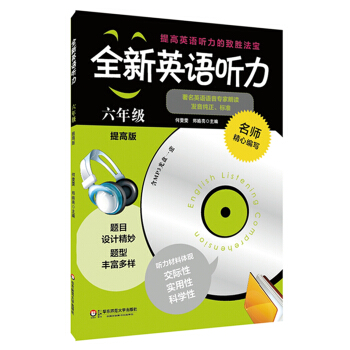

具体描述
产品特色
内容简介
1.英语四级阅读20篇题源外刊文章+700个核心英语四级词汇;
2.英语四级阅读词汇理解35篇+长篇阅读15篇+仔细阅读70篇;
3.英语四级阅读综合模拟训练10套,共40篇;
4.英语四级阅读高频语法+难句突破;
5.分题型总结英语四级阅读解题技巧;
6.赠配套全文翻译本。
内页插图
目录
1.《大学英语四级阅读180篇》
Part 1 题源英语四级阅读记单词20篇
《纽约时报》
Passage 1剽窃有理?
Passage 2独自吃饭的人工作效率更高
Passage 3健身营养品的成效遭到质疑
《新闻周刊》
Passage 4 让贫困生通过工作来付学费
Passage 5数字化时代的丑事更易被公诸于众
Passage 6欧洲男性的平均身高增加了11 厘米
Passage 7网络技术由开放趋向封闭
《卫报》
Passage 8 银行见习生之死引发的风波
Passage 9 海豚为糖尿病的治疗提供了线索
Passage 10 在适当的时间做适当的事
Passage 11 “不做家庭作业”协议
《华盛顿邮报》
Passage 12 社交网络利大于弊
Passage 13 采取措施,减少食品废物
Passage 14 心情愉悦使人更年轻
《时代周刊》
Passage 15 青蛙或可预测地震
Passage 16 金钱真能换取快乐?
Passage 17为什么说电动汽车造成的污染更多?
Passage 18 美国作家卡佛小传
《今日美国》
Passage 19在家工作并不意味着家庭更美满
Passage 20商务旅行预计将有所增长
Part 2 高频英语四级语法与阅读难句归纳
第一章 定语从句
第二章 状语从句
第三章 非谓语动词
第四章 名词性从句
第五章 并列平行结构
第六章 同位成分和插入语
第七章 比较结构
第八章 复杂修饰语
第九章 倒装
第十章 虚拟语气
第十一章 指代
Part 3 英语四级阅读词汇理解35篇
第一章 英语四级阅读词汇理解解题攻略
第二章 英语四级阅读词汇理解强化训练35篇
Passage 1~ Passage 6 文化教育类
Passage 7~ Passage 15 社会生活类
Passage 16~ Passage 22 科普知识类
Passage 23~ Passage 28 自然环境类
Passage 29~ Passage 35 商业经济类
Part 4 英语四级长篇阅读15篇
第一章 英语四级长篇阅读解题攻略
第二章 英语四级长篇阅读强化训练15篇
Passage 1~ Passage 3 文化教育类
Passage 4~ Passage 7 社会生活类
Passage 8~ Passage 10 科普知识类
Passage 11~ Passage 12 自然环境类
Passage 13~ Passage 15 商业经济类
Part 5 英语四级仔细阅读70篇
第一章 英语四级仔细阅读解题攻略
第二章 英语四级仔细阅读强化训练70篇
Passage 1~ Passage 15 文化教育类
Passage 16~ Passage 36 社会生活类
Passage 37~ Passage 50 科普知识类
Passage 51~ Passage 57 自然环境类
Passage 58~ Passage 70 商业经济类
Part 6 英语四级阅读综合模拟40篇
Model Test 1~ Model Test 10
2.《大学英语四级阅读180篇 配套全文翻译》
精彩书摘
Money Isn’t Everything, But Status Is!
The Beatles sang that money can’t buy you love. But what about happiness? Research consistently shows that the more money people have, the more likely they are to report being satisfied with their lives.
And that makes sense: money buys you things that make life easier and more satisfying; the easier your life, the happier you tend to be. That relationship isn’t entirely linear (线性的), since there’s a limit to how much wealth can please you; the happiness benefit of an increasing income is especially powerful among people who don’t have much money to start with, and diminishes as wealth increases. But studies also reveal that as average income levels have risen over time—in the U.S. and European nations, for example—residents of those countries have not reported being any happier than people were 30 or 40 years ago. It’s a contradiction that while income and happiness may be associated within a population at any given moment, overall economic growth does not appear to correspond to a boost in national satisfaction over time.
To understand why, researchers at the University of Warwick and Cardiff University decided to break down how individual people evaluate their income. What does wealth mean to people? Previous work has suggested that people tend to value their own wealth more—and are happier—when it compares favorably to everyone else’s. The so-called reference-income hypothesis (假说) holds that it’s not simply how much money you make that contributes to satisfaction, but how much more money you make than, say, the national average.
The higher your salary than the national average, the happier you tend to be.
But the reference-income hypothesis is rather abstract. The researchers wondered whether there was a more concrete way to capture how people valued their income. They reasoned that people tend to make specific comparisons of personal wealth, not only with the average income of the larger population, but with the individual incomes of their neighbors, colleagues at work or friends from college. And the higher their rank, the greater their sense of happiness and self-worth would likely be. “For example, people might care about whether they are the second most highly paid person, or the eighth most highly paid person, in their comparison set,” write a psychologist, Chris Boyce.
……
前言/序言
用户评价
我最近在刷四级真题,发现自己最大的瓶颈在于长难句的解析不够细致。很多时候,我能大致猜出文章的意思,但一到细节题就抓瞎,原因就在于那些绕来绕去的从句结构把我绕晕了。听说这本书在语法和难句解析上下了很大功夫,我对此非常看重。一个好的语法讲解,不应该是冷冰冰的规则堆砌,而是要能结合阅读材料,把晦涩的句子拆解得一目了然。我希望它能提供那种“庖丁解牛”式的分析,比如如何快速识别主干、如何处理插入语和非谓语动词的干扰。如果能提供一些记忆和快速处理复杂句式的“小窍门”就更好了。另外,附赠的“全文翻译本”也是我考虑入手的关键因素之一。阅读速度上不去,很大程度上是因为每读到一个生词或一个复杂结构,就得停下来查阅或回溯,影响了阅读的流畅性。有了全文翻译,我可以先做题,做完后对答案,再对比翻译,这样可以系统性地纠正理解上的偏差,对比一下自己的理解和标准译文之间的差距,找出自己“脑补”的错误点。这种精校对的材料,对于精细打磨阅读技巧是不可或缺的,它能帮我建立起一个正确的语感和理解模型。
评分对于一个注重效率的学习者来说,资料的实用性和针对性是首要考量。这套书的定位是“大学英语四级阅读”,这意味着它所有的内容都必须紧密围绕考试大纲和出题逻辑来设计。我希望这180篇文章不仅仅是随便找来的外刊文章堆砌,而是经过精心筛选和改编,确保它们在难度梯度上是合理的。从易到难,循序渐进地训练我的阅读耐力和准确率。特别是对于那些模拟题,我非常关注它的“像不像”——它是否能精准复刻四级阅读的出题风格,比如主旨题的设问方式、细节题的干扰项设置等等。如果能附带一些答题技巧的分析就更完美了,比如在遇到时间紧张时,如何快速定位信息源,如何排除那些明显带有感情色彩或过度概括的选项。我需要的是一套能教会我“如何应试”的工具,而不是一本单纯的英语阅读欣赏集。如果它能帮助我找到最适合自己的答题节奏和策略,那么它的价值就体现出来了。
评分这套书的整体布局和学习闭环设计给我留下了深刻的印象。我关注的是它如何构建一个完整的学习流程。首先是大量的阅读输入(180篇),然后是针对性的难点突破(语法与难句解析),最后是辅助记忆和理解的工具(全文翻译和外刊记词)。这种结构似乎是为自学型考生量身定做的。我设想中的使用场景是:先带着目标做题,检验自己的当前水平;然后对照难句解析,搞清楚错误的原因,是理解错误还是单词障碍;最后利用翻译本和词汇部分进行查漏补缺,把这次阅读中遇到的所有知识点都消化吸收掉。如果这个闭环能够流畅运转,那么做完一篇文章,我收获的就不只是一个分数,而是实实在在的阅读能力的提升。这种系统性的设计,远比那些只提供大量题目的资料要来得有价值,它提供的是一个完整的提升方案,而不是一个简单的练习集,让人感到自己的投入是值得的,备考过程也变得更有条理和方向感。
评分说到备考资料,我最怕的就是那种“假大空”的词汇列表,背了半天,考场上却一个也遇不到,或者遇到的都是些偏门到不行的生僻词。我对这套书的“六大题源外刊记单词”部分抱有很高的期待。我倾向于在语境中学单词,而不是孤立地背诵词汇表。如果它能做到将核心词汇嵌入到那些外刊文章中,并且对这些词汇进行针对性的标注和记忆引导,那效果肯定比单纯的词汇书要好得多。我希望这些词汇不仅是四级高频词,最好还能兼顾到六级的基础储备,实现一书两用,性价比更高。记忆方法也需要多样化,比如提供词根词缀的拆解,或者通过联想记忆法来加深印象。最理想的状态是,这本书能提供一个清晰的词汇掌握路径,比如“文章高频词”、“语法点相关词”等分类,让我可以根据自己的薄弱环节进行重点突破。毕竟,阅读速度的提升,说到底还是词汇量的支撑,词汇量上去了,阅读的底层逻辑才会更顺畅。
评分这本书的封面设计挺抓人眼球的,特别是那个“180篇”的数字,让人感觉内容量十足。我拿到手的时候,首先注意到的是纸质感,摸起来还挺厚实的,感觉可以反复翻阅,不容易磨损。说实话,我买四级备考资料主要就是图个踏实,看到这种大部头的,心里就踏实了一半。我之前用过一些其他家的资料,篇幅短小,做完一遍感觉信息量太少,很快就没了新鲜感。但光是看目录,我就知道这本的阅读材料覆盖面应该挺广的,毕竟“六大题源外刊”听起来就比一般那种只挑几个常见主题的要全面得多。我特别期待里面的文章能跟得上时事热点,毕竟四级阅读考察的不仅仅是语言能力,还有对国际文化的了解程度。如果文章质量高,能让我接触到不同领域的专业词汇和表达方式,那对以后的六级乃至考研都会有潜在的帮助。包装和装帧上看得出是用心了的,字体排版也比较清晰,对于长时间阅读来说,视觉疲劳感会相对低一些,这是非常重要的加分项。总体来说,初步印象是这套书的体量和广度都达到了我的预期,希望能给我接下来的备考带来实质性的提升。
评分还好还好,书不错,物流很快的,
评分好评好评好评!!!!!!!!!!!!!!
评分阅读要多做多练,四级必须过
评分非常满意,很快,而且,书挺好的,四级的资料都买的华研外语的
评分孩子需要的书籍,印刷质量不错,值得购买。
评分啦啦啦啦啦啦啦啦啦啦啦啦啦啦啦啦啦啦啦啦
评分书包装很好,经典读物,值得拥有。
评分送货迅速,物美价廉,东西很好,在京东买东西很方便,速达!
评分挺好的,送货挺速度
相关图书
本站所有内容均为互联网搜索引擎提供的公开搜索信息,本站不存储任何数据与内容,任何内容与数据均与本站无关,如有需要请联系相关搜索引擎包括但不限于百度,google,bing,sogou 等
© 2026 book.teaonline.club All Rights Reserved. 图书大百科 版权所有














![清华中学英语分级读物:中学生百科英语1(Facts & Figures,附CD-ROM光盘1张) [Reading & Vocabulary Development 1 Facts & Figures] pdf epub mobi 电子书 下载](https://pic.qciss.net/11419597/55eea0f0N4c9a4902.jpg)





